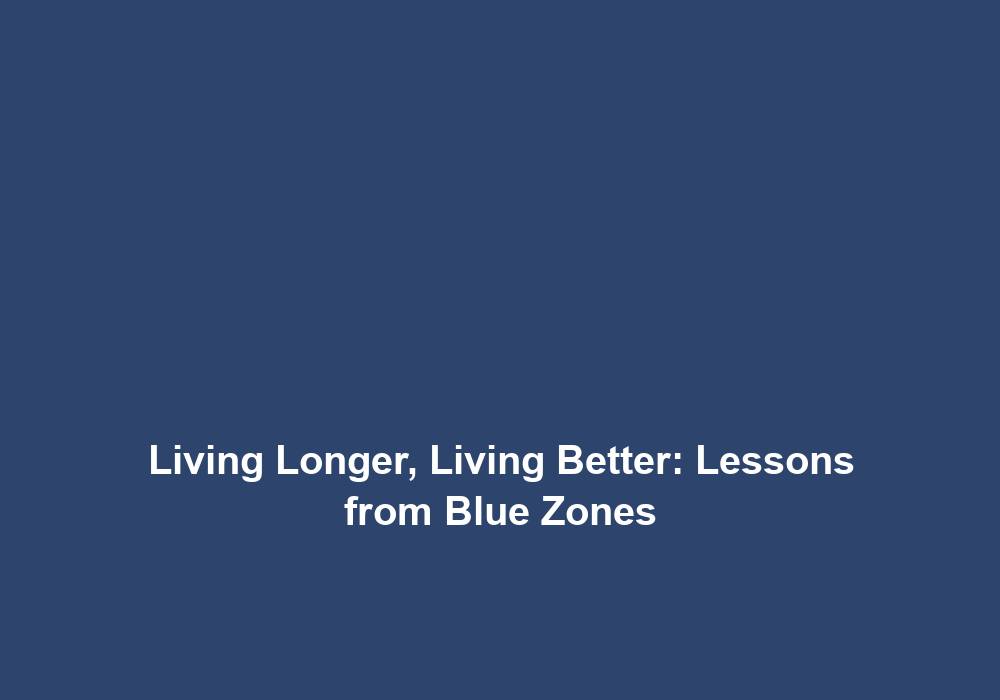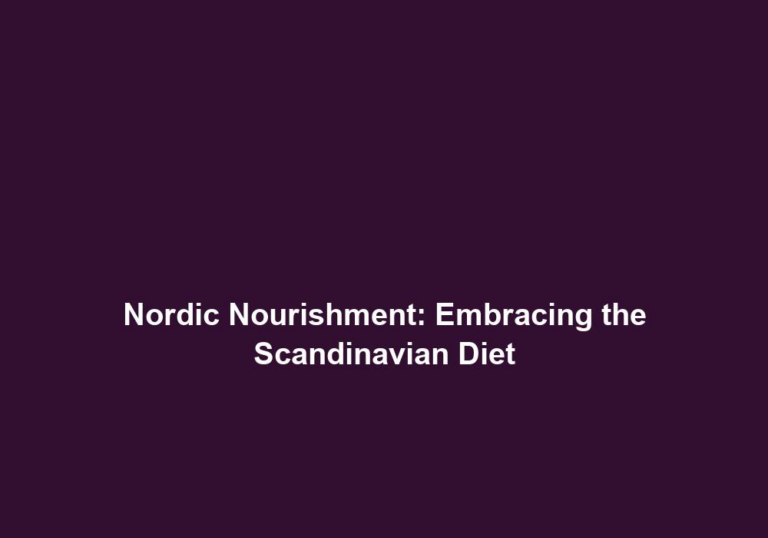Living Longer, Living Better: Lessons from Blue Zones
The concept of living longer and living better is a universal desire among individuals seeking a fulfilling and healthy lifestyle. One intriguing phenomenon that has caught the attention of researchers and health enthusiasts is the concept of Blue Zones. These are regions around the world where people tend to live exceptionally long and healthy lives. In this article, we will explore the lessons we can learn from these Blue Zones and how we can apply them to our own lives.
What are Blue Zones?
Blue Zones are geographical areas where individuals have a significantly higher life expectancy and lower rates of chronic diseases compared to global averages. Researchers have identified five main Blue Zones around the world:
-
Ikaria, Greece: This small island in the Aegean Sea is known for its elderly population who enjoy remarkable longevity, with a focus on a Mediterranean diet and an active lifestyle.
- The Mediterranean diet, which is rich in fruits, vegetables, whole grains, legumes, and olive oil, has been associated with numerous health benefits. It is low in saturated fats and high in monounsaturated fats, which can help reduce the risk of heart disease and improve overall cardiovascular health. Additionally, the active lifestyle of the Ikarian population, which includes daily physical activities like walking, gardening, and socializing, contributes to their longevity.
-
Okinawa, Japan: Okinawa is renowned for having the highest number of centenarians per capita in the world. The residents’ diet consists of nutrient-rich foods like sweet potatoes, vegetables, and tofu.
- The traditional Okinawan diet is low in calories and high in nutrients. It emphasizes a variety of plant-based foods, including vegetables, fruits, whole grains, and legumes. Sweet potatoes, in particular, are a staple in their diet and are rich in fiber, antioxidants, and vitamins. The consumption of tofu, a soy-based product, provides them with plant-based protein, which is a healthier alternative to animal protein. These dietary choices, combined with regular physical activity and a strong sense of community, contribute to the exceptional health and longevity of the Okinawan people.
-
Sardinia, Italy: Sardinia boasts a high concentration of male centenarians, which has attracted attention from researchers. The inhabitants follow a traditional diet rich in whole grains, vegetables, and goat’s milk.
- The traditional Sardinian diet is centered around whole, unprocessed foods. It includes a variety of vegetables, whole grains like barley and wheat, and goat’s milk, which is a good source of protein and calcium. The consumption of these nutrient-dense foods, along with regular physical activity and a close-knit community, contributes to the longevity and well-being of the Sardinian population.
-
Nicoya Peninsula, Costa Rica: With a lower rate of middle-age mortality and a large number of centenarians, the Nicoya Peninsula emphasizes a close-knit social structure, daily physical activity, and a plant-based diet.
- The traditional diet of the Nicoyan people is primarily plant-based, consisting of beans, corn, rice, tropical fruits, and vegetables. This diet is high in fiber, vitamins, and minerals, which promote overall health and reduce the risk of chronic diseases. The Nicoyan community also places great importance on social connections and support systems, which contribute to their well-being and longevity.
-
Loma Linda, California, USA: Loma Linda is home to a community of Seventh-day Adventists who have a life expectancy significantly higher than the average American. Their lifestyle includes a plant-based diet, regular exercise, and a strong sense of faith.
- The Seventh-day Adventist community in Loma Linda follows a plant-based diet, which includes a variety of fruits, vegetables, whole grains, legumes, and nuts. Their diet is low in saturated fats and cholesterol, which contributes to a reduced risk of heart disease. Regular exercise, such as walking, cycling, and gardening, is also an integral part of their lifestyle. Additionally, their strong sense of faith and community provides them with emotional support and a positive outlook on life, contributing to their overall well-being.
Lessons from Blue Zones
1. Embrace a Plant-Based Diet
One common dietary pattern observed in all Blue Zones is a predominantly plant-based diet. Vegetables, legumes, whole grains, and fruits form the foundation of their meals, while meat consumption is limited. Plant-based diets are rich in vitamins, minerals, and fiber, contributing to lower rates of heart disease, obesity, and certain cancers. Consider incorporating more plant-based meals into your diet to reap the health benefits observed in Blue Zones.
- Include a variety of colorful fruits and vegetables in your meals to ensure a wide range of nutrients.
- Experiment with different plant-based protein sources such as beans, lentils, tofu, and tempeh.
- Replace refined grains with whole grains like quinoa, brown rice, and whole wheat bread to increase fiber intake.
- Incorporate nuts, seeds, and olive oil as sources of healthy fats into your diet.
2. Stay Active Throughout Life
Physical activity plays a vital role in the lives of individuals in Blue Zones. Engaging in regular physical activities such as walking, gardening, and other forms of exercise helps maintain a healthy weight, strengthens bones and muscles, and reduces the risk of chronic diseases. Find activities you enjoy and make them a regular part of your routine to improve your overall health and well-being.
- Aim for at least 150 minutes of moderate-intensity aerobic exercise or 75 minutes of vigorous-intensity aerobic exercise per week.
- Include strength training exercises at least twice a week to maintain muscle mass and strength.
- Take breaks from sitting or sedentary activities every hour and incorporate light stretching or movement.
- Explore different forms of physical activity such as dancing, swimming, cycling, or yoga to keep yourself motivated and engaged.
3. Cultivate Strong Social Connections
Blue Zones highlight the importance of strong social connections and a sense of community in promoting longevity and well-being. Regular social interactions, support systems, and a sense of belonging have been found to decrease stress levels and increase overall happiness. Nurture relationships with family, friends, and your community to experience the benefits of a fulfilling social life.
- Schedule regular social activities and gatherings with loved ones and friends.
- Join clubs, organizations, or volunteer groups that align with your interests and values.
- Engage in meaningful conversations and actively listen to others.
- Offer support and help to those around you, fostering a sense of community.
4. Practice Mindful Eating
Mindful eating is another crucial lesson we can learn from Blue Zones. Taking the time to savor meals, eating slowly, and paying attention to hunger and fullness cues can help prevent overeating and promote better digestion. This practice allows individuals to enjoy their food fully while being more in tune with their body’s needs.
- Eat meals without distractions, such as television or electronic devices, to focus on the sensory experience of eating.
- Chew your food thoroughly and savor each bite, paying attention to flavors, textures, and aromas.
- Pause between bites and check in with your hunger and fullness levels.
- Listen to your body's signals and eat until you are satisfied, not overly full.
5. Prioritize Quality Sleep
Adequate sleep is essential for overall health and well-being. Blue Zone residents prioritize quality sleep by following consistent sleep routines and creating a conducive sleep environment. Getting enough sleep not only improves concentration and productivity but also supports a healthy immune system and reduces the risk of chronic diseases.
- Aim for 7-9 hours of sleep per night, depending on your individual needs.
- Establish a consistent sleep schedule by going to bed and waking up at the same time each day, even on weekends.
- Create a sleep-friendly environment by keeping your bedroom cool, dark, and quiet.
- Practice relaxation techniques, such as deep breathing or meditation, before bed to promote a restful sleep.
6. Find Purpose and Maintain a Positive Outlook
Having a sense of purpose and maintaining a positive outlook on life can significantly contribute to longevity and overall happiness. Blue Zone inhabitants often have strong faith or spiritual beliefs that give them a sense of purpose and fulfillment. Engage in activities that bring you joy and a sense of fulfillment, and maintain a positive mindset to enhance your overall well-being.
- Identify your passions and interests and pursue them wholeheartedly.
- Set meaningful goals that align with your values and aspirations.
- Practice gratitude and positive affirmations to cultivate a positive mindset.
- Engage in acts of kindness and contribute to your community to find a sense of purpose.
Conclusion
The concept of Blue Zones provides valuable insights into the secrets of living longer and living better. By adopting the lessons learned from these regions, such as embracing a plant-based diet, staying active, cultivating social connections, practicing mindful eating, prioritizing quality sleep, and finding purpose, we can enhance our own health and well-being. Incorporate these principles into your lifestyle, and you may find yourself on the path to a longer, healthier, and more fulfilling life.







